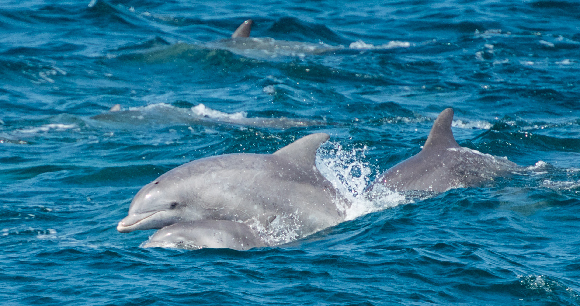
Country’s Fishing Fleet Lacks Adequate Protections for Dolphins, Whales
Washington, DC—A report released today by conservation and animal protection groups finds that Ecuador’s fishing industry does not meet US standards for limiting whale and dolphin bycatch. As a result, Ecuador may lose access to the US seafood import market for some products in 2024. Ecuador exports around $1.6 billion of seafood to the United States annually.
Under a US legal requirement enacted in 2016 and phased in since then, all nations that export seafood to the United States must demonstrate that they meet the same strict marine mammal protection standards required of US fishers. If nations fail to show they meet these standards, the United States must ban non-compliant seafood imports starting on January 1, 2024.
While Ecuador’s Organic Fisheries Law, enacted in 2020, made great strides in regulating Ecuador’s massive fishing industry, it lacks requirements restricting the entanglement of whales and dolphins. Each year, fishermen around the globe kill or seriously injure an estimated 650,000 dolphins, whales, seals and other marine mammals.
“Fishing gear threatens Ecuador’s incredible diversity of dolphins and whales, and major consequences loom if this lethal problem isn’t fixed,” said Sarah Uhlemann, international program director at the Center for Biological Diversity. “We’re concerned about the intelligent creatures entangled in Ecuadorian nets, but we’re also worried for Ecuador’s hardworking fishers. If they can’t sell their fish products in the lucrative US seafood market, it will be a huge economic blow. Ecuador’s government needs to build on its new fishing law by tracking and limiting bycatch to save marine mammals and their export fishing industry.”
Nearly 30 different species of marine mammals inhabit Ecuadorian waters. Ecuador does not monitor whale and dolphin populations or adequately track how much bycatch occurs in all its export fisheries, as detailed in the report released by the Center for Biological Diversity, the Animal Welfare Institute and NRDC (Natural Resources Defense Council).
However, scientists have documented several dolphin species caught in gillnets as bycatch, including a declining population of bottlenose dolphins in the Gulf of Guayaquil. Without comprehensive monitoring of how bycatch impacts these populations, Ecuador cannot demonstrate that it meets US standards.
“People love whales and dolphins, and US consumers deserve to know that the seafood they eat meets US standards for protecting these amazing animals,” said Zak Smith, global biodiversity conservation director at NRDC (Natural Resources Defense Council). “Ecuador had more than six years to get its fisheries and marine mammal programs up and running in time to show results, but it failed to do so. US fishermen and consumers shouldn’t suffer from that failure; Ecuador's non-compliant seafood should be banned.”
Recent scientific research indicates that the practice of using incidentally captured or killed marine mammals as bait in Fish Aggregating Devices, or FADS, is emerging as a potential threat to Ecuador’s cetacean and pinniped populations, with at least six species being used for this purpose. Fishers float FADS on the ocean surface to attract fish.
“The Ecuadorian government must do all it can to ensure that dolphins, whales, and sea lions are not used as bait in any of its fisheries, including FAD fisheries,” said Kate O’Connell, marine wildlife consultant with the Animal Welfare Institute. “The US government should encourage Ecuador to proactively address this issue through improved monitoring of its bycatch, and an explicit ban on the use of marine mammals as bait.”
In 2021, the U.S. imported 226,480 metric tons of fish products from Ecuador. Primary imports include tuna, shrimp, mahi-mahi (also called dorado or dolphinfish), and swordfish. The US National Marine Fisheries Service is set to decide in November 2023 which global fisheries can continue to export to the United States.
Marjorie Fishman, Animal Welfare Institute
[email protected], (202) 446-2128
Sarah Uhlemann, Center for Biological Diversity
[email protected], (206) 327-2344
Kate O’Connell, Animal Welfare Institute
[email protected], (860) 990-7858 (en español)
Addison Wingate, Natural Resources Defense Council
[email protected], (310) 434-2391
The Animal Welfare Institute (awionline.org) is a nonprofit charitable organization founded in 1951 and dedicated to reducing animal suffering caused by people. AWI engages policymakers, scientists, industry, and the public to achieve better treatment of animals everywhere—in the laboratory, on the farm, in commerce, at home, and in the wild. Follow us on Facebook, Twitter, and Instagram for updates and other important animal protection news.
The Center for Biological Diversity (biologicaldiversity.org) is a national, nonprofit conservation organization with more than 1.7 million members and online activists dedicated to the protection of endangered species and wild places.
NRDC (Natural Resources Defense Council) is an international nonprofit environmental organization with more than 3 million members and online activists. Since 1970, our lawyers, scientists, and other environmental specialists have worked to protect the world's natural resources, public health, and the environment. NRDC has offices in New York City, Washington, D.C., Los Angeles, San Francisco, Chicago, Bozeman, MT, and Beijing. Visit us at www.nrdc.org and follow us on Twitter @NRDC.